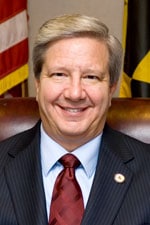Co-authored by Steve Horn and Caroline Selle
DeSmogBlog has obtained documents revealing that the government of Calvert County, MD, signed a non-disclosure agreement on August 21, 2012, with Dominion Resources — the company proposing the Cove Point Liquefied Natural Gas (LNG) export terminal in Lusby, MD. The documents have raised concerns about transparency between the local government and its citizens.
The proposal would send gas obtained via hydraulic fracturing (“fracking”) from the Marcellus Shale basin to the global market. The export terminal is opposed by the Chesapeake Climate Action Network, Maryland Sierra Club and a number of other local environment and community groups.
The Accokeek Mattawoman Piscataway Creeks Council (AMP Council), an environmental group based in Accokeek, MD, obtained the documents under Maryland’s Public Information Act and provided them to DeSmogBlog.
Cornell University’s Law School explains a non-disclosure agreement is a “legally binding contract in which a person or business promises to treat specific information as a trade secret and not disclose it to others without proper authorization.”
Upon learning about the agreement, Fred Tutman, CEO of Patuxent Riverkeeper — a group opposed to the LNG project — told DeSmogBlog he believes Calvert County officials are working “in partnership with Dominion to the detriment of citizen transparency.”
“We’re unhappy that it does seem to protect Dominion’s interest rather than the public interest,” Tutman said. “The secrecy surrounding this deal has made it virtually impossible for anyone exterior to those deals, like citizens, to evaluate whether these are good transactions or bad transactions on their behalf.”
Details of the Non-Disclosure Agreement
The six-page non-disclosure agreement explains Calvert County “desires to participate in discussions regarding Calvert County property tax credits. During these discussions, [Dominion] may share certain proprietary information with the [county].”
What’s confidential? According to the non-disclosure agreement,
“… any data or information…not generally known to the public, whether in tangible or intangible form, and meeting the requirements for mandatory denial of inspections pursuant to the Maryland Public Information Act…whenever and however disclosed, including, but not limited to: (i) marketing strategies, plans, financial information, or projections, operations, sales estimates, business plans and performance results relating to the past, present or future business activities of such party, its affiliates, subsidiaries and affiliated companies; (ii) plans for products or services, and customer supplier lists; (iii) any scientific or technical information, invention, design, process, procedure, formula, improvement, technology or method; (iv) any concepts, reports, data, know-how, works-in-progress, designs, development tools, specifications, computer software, source code, object code, flow charts, databases, inventions, information and trade secrets; and (v) any other information that should reasonably be recognized as confidential information of [DCP].”
In a statement provided to DeSmogBlog, Calvert County Commissioner Evan K. Slaughenhoupt, Jr. said it would be the “height of naiveté” to think a government would not sign a non-disclosure agreement in this type of situation, given the stakes involved.

Evan K. Slaughenhoupt, Jr.; Photo Credit: Calvert County
“When businesses have contractual concerns, and meet with elected officials in a lawful duly authorized executive session to discuss expansion of a business, I honor my responsibility to not convey what was discussed in such a session,” he said. “Citizens expect no less of that from us.”
Non-Disclosure Agreements “Normal Part of Negotiations”
The use of non-disclosure agreements by local governments is not unprecedented. Some cases in point:
– In 2008, Kitsap County, WA, officials signed a non-disclosure agreement with NASCAR when deliberating over building a race track there. Met with opposition from citizens, the deal fell through for Kitsap.
– In 2013, Nike released three non-disclosure agreements it had signed with Washington County, OR, pertaining to facilities it planned to build in Portland, where it is headquartered.
– Weapons manufacturer Prometheus Solutions recently signed a non-disclosure agreement with Somervell County, TX, for the details surrounding construction of a manufacturing site there.
Queried about Dominion’s non-disclosure agreement with Calvert County, Dominion spokesman Jim Norvelle told DeSmogBlog such agreements are “a routine, normal part of negotiations involving multi-billion dollar economic development projects.”
“Companies and counties often use non-disclosure agreements because they each need to share business-sensitive, confidential information that cannot be shared with other businesses or counties for competitive reasons,” Norvelle said. “The result this time around is certainty for both Dominion and the county.”
U.S. Congressmembers Decline Comment
Asked for comment on the agreement on multiple occasions by DeSmogBlog, Maryland’s U.S. Senators Ben Cardin (D) and Barbara Mikulski (D) declined to comment, as did U.S. Rep. and Democratic Party Whip Steny Hoyer.
“The non-disclosure agreement is between two parties — Calvert County and Dominion — and the process by which it was developed did not involve federal action so neither Mr. Hoyer nor his staff had a role in developing the agreement,” Hoyer Press Secretary Mariel Saez told DeSmogBlog.
Rep. Hoyer received $10,000 from Dominion prior to the 2012 elections and has taken another $5,000 in the run-up to the 2014 elections. Sen. Cardin received $9,000 before the 2012 elections, while Mikulski received $1,000 in 2012 and has taken $2,500 for the current campaign cycle.
In Whose Best Interest?
The original recipient of the records, AMP Council, sees things differently than the two parties to the non-disclosure agreement.
“Citizens [can’t] participate effectively in the legislative process because the non-disclosure agreement prevented Calvert County commissioners and staff from giving people the information they needed to understand Dominion’s financial status and outlook, thereby making it impossible for them to make informed recommendations to the people they elected to represent them,” a press statement from the council reads.
“The commissioners were working with Dominion’s best interests in mind, not the people’s.”
Still awaiting a final approval from the Federal Energy Regulatory Commission and from Maryland’s Public Service Commission, Dominion received a conditional permit for Cove Point LNG export terminal in May 2013 from the U.S. Department of Energy.
If the project moves forward, Cove Point would be the first Marcellus Shale-area east coast LNG export terminal.
Only one LNG terminal has received all the permits necessary to open shop in the U.S.: Cheniere’s Sabine Pass LNG export facility, located on the Louisiana coast. Sabine Pass is scheduled to become operational in late 2015.
Subscribe to our newsletter
Stay up to date with DeSmog news and alerts








